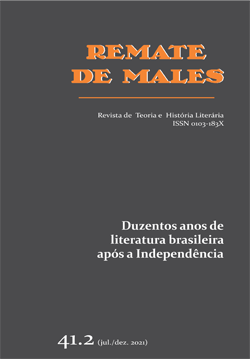Abstract
The article debates the relations between spatial displacement and self-formation in the trajectories of the protagonists of Fernando Sabino’s Time to meet and Carlos Heitor Cony’s O ventre, taken as representatives of the 1950s’ Brazilian Bildungsroman. It claims that that relationship revealed a new image of the self in the Brazilian novel, represented through socially misplaced characters driven to conflictive processes of existential affirmation. We observe how the topic of the travel gave physicality to those processes, as it allowed the writers to dramatize the search for ways of accommodation in the world that should be discovered through the experience of the world. We use Kockelman’s (2012) concept of “map” to observer how values influence the construction of subjects and social worlds; more specifically, we identify how the existential function of the travel echoed values initially formulated in the early romantic period. To explain the relevance of those values in 1950s Brazil, and thereby the importance achieved by the Bildungsroman in the country’s literature, we suggest that the genre gave expression to the anxieties of a youth trapped in the transition between models of life founded upon the obedience to traditional institutions, and the full legitimation of the personal construction of one’s own modes of life, which would only take place in later generations. In the end, we digress briefly about the relationship between the works analyzed in the article and later versions of the self in the Brazilian novel.
References
BERLIN, Isaiah. As raízes do Romantismo. São Paulo: Três Estrelas, 2015.
BOOKER, Christopher. The Seven Basic Plots: Why we Tell Stories. 19. ed. [Kindle]. New York: Continuum, 2010.
CONY, Carlos Heitor. O ventre. 8. ed. São Paulo: Companhia das Letras, 1998.
EHRENBERG, Alain. The Weariness of the Self Diagnosing the History of Depression in the Contemporary Age. Quebec City: McGill-Queen’s University Press, 2010.
FUREDI, Frank. New Forms of Alienation. In: KENNEDY, Angus; PANTON, James (Org.). From Self to Selfie. A Critique of Contemporary Forms of Alienation. Londres: Palgrave Macmillan, 2019a.
FUREDI, Frank. The Emergence of the Self in History. In: KENNEDY, Angus; PANTON, James (Orgs.). From Self to Selfie. A Critique of Contemporary Forms of Alienation. Londres: Palgrave Macmillan, 2019b, pp. 13-26.
GOETHE, Johann Wolfgang von. Os Anos de Aprendizado de Wilhelm Meister. 2. ed. São Paulo: Editora 34, 2009.
KOCKELMAN, Paul. Agent, Person, Subject, Self: A Theory of Ontology, Interaction, and Infrastructure. New York: Oxford University Press, 2012.
LUKÁCS, Georg. A Teoria do Romance. São Paulo: Editora 34, 2000.
MASSAUD, Moisés. Dicionário de termos literários. 12. ed. São Paulo: Cultrix, 2004.
MORETTI, Franco. Atlas do romance europeu: 1800-1900. São Paulo: Boitempo, 2003.
MORETTI, Franco. A alma e a harpia: reflexões sobre as metas e os métodos da Historiografia Literária. In: Signos e estilos da Modernidade: ensaios sobre a sociologia das formas literárias. Rio de Janeiro: Civilização Brasileira, 2007, pp. 13-56.
SABINO, Fernando. O encontro marcado. 76. ed. São Paulo: Record. 2008.
SAFRANSKI, Rüdiger. Romantismo: uma questão alemã. São Paulo: Estação Liberdade, 2012.
SARTRE, Jean-Paul. O ser e o nada – ensaio de ontologia fenomenológica. 15. ed. Petrópolis: Vozes, 2007.

This work is licensed under a Creative Commons Attribution-NonCommercial 4.0 International License.
Copyright (c) 2022 Pedro Dolabela Chagas, Luiz Guilherme Oliveira


